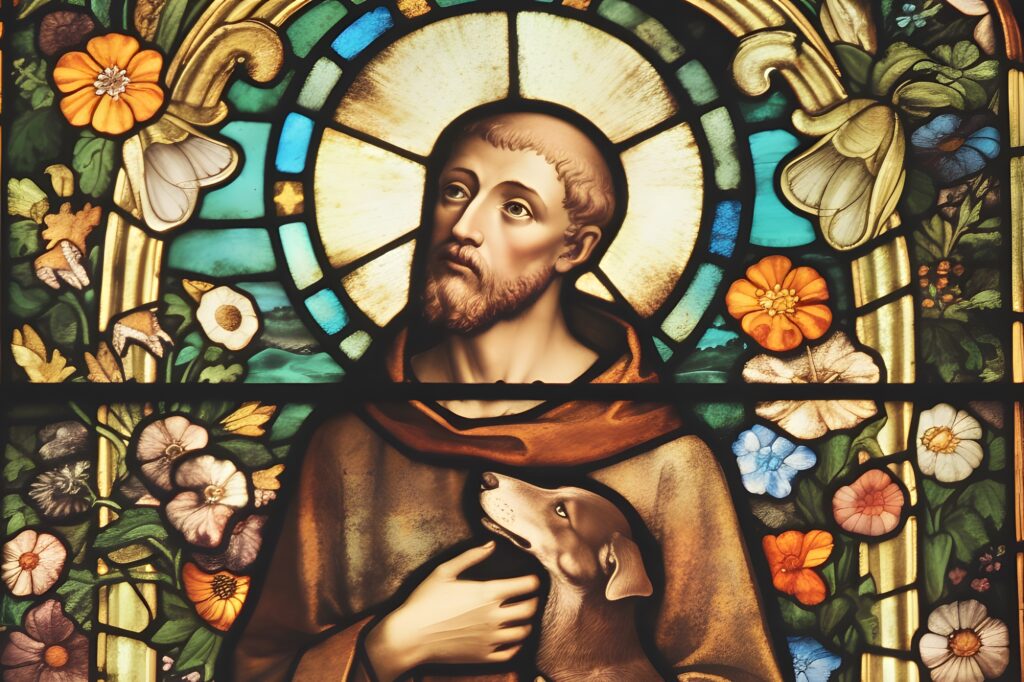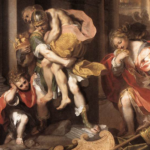To what do we owe the spirit that produced the achievements of the modern West? Why did the peoples of Europe, crammed into a peninsula on the western edge of Asia, produce art, science, economic prosperity, and moral idealism—not unmarred by greedy conquest, war, and other grave sins—that changed the world?
Some credit the Enlightenment that promoted respect for human dignity and founded modern political and economic theory. Others credit the scientific revolution that unlocked the secrets of nature to conquer disease, want, and other physical limitations. Others credit the Renaissance humanism that gave birth to both science and the Enlightenment, and that produced some of the greatest art in history.
But many have suggested that much of the credit should go to the medieval Italian friar whom Catholics celebrate today: Francis of Assisi, the son of a well-to-do merchant who gave up his wealth to follow God and founded the Franciscan order. One cannot credit Francis and his followers directly with creating our civilization; but in them, for the first time, many elements converged that gave rise to the world we live in. Understanding his spirit might help illuminate our current cultural challenges.
Man of the World, Man of the People
Start your day with Public Discourse
Sign up and get our daily essays sent straight to your inbox.Unlike the austere monks of the so-called Dark Ages that preceded him, Francis loved nature with a joy that is recognizably modern. He called the sun his brother and the moon his sister, and he even preached to animals. His appreciation of how creation reflected God’s wisdom inspired the Franciscan Roger Bacon to investigate rigorously the causes of natural phenomena, thus preparing the way for modern empirical science.
Francis was perhaps the first modern humanitarian. He showed heroic concern for everyone, regardless of their appearance or religion. He embraced a leper he met on the road and kissed his rotting flesh. He braved passage through warring armies to reach the Muslim sultan, trying to convert him by persuasion, not force. “[T]here was never a man,” G. K. Chesterton says, “who looked into those brown burning eyes without being certain that Francis . . . was really interested in him; in his own inner individual life.”
Francis was the first “genuine democrat,” taking special interest in helping ordinary people grow closer to God. His order fostered many popular religious devotions (like the Stations of the Cross and Eucharistic Adoration) that remain central to Christianity. Their attention to the poor emboldened the latter to seek better treatment from their worldly masters through the social justice movements of the 1300s.
Franciscans’ concern for the poor led them to lay important foundations of the modern economy. Some started interest-free micro-lending banks for the indigent. But soon they realized they had to charge some interest to keep the banks viable, thus becoming the first Europeans to discover that not all interest is usurious. The Franciscan Bernardine of Siena went on to defend commerce as a profession, saying it was bad only when done unjustly. He also helped develop the theory of market economics.
Chesterton also credits Francis with inspiring modern art. He composed what some say is the first poem in vernacular Italian, the “Canticle of the Sun.” He made the first nativity scene (with live figures). And countless artists from Dante to Giotto to the present have found inspiration from the scenes of his life, which rival the most famous plays in their dramatic force. He did not create great art, but our appreciation of the beauty of life would not have been the same without him.
Francis was the first “genuine democrat,” taking special interest in helping ordinary people grow closer to God. His order fostered many popular religious devotions (like the Stations of the Cross and Eucharistic Adoration) that remain central to Christianity.
A Latter-Day Pagan?
What explains this new turn in Francis toward a love for life?
Popular opinion suggests it was that Francis rediscovered the pagan spirit of ancient Greece and Rome. After all, the ancients famously delighted in the beauty and order of the world. Greek painting and sculpture were the models for Renaissance art, and all philosophy is just “footnotes to Plato,” as Alfred Whitehead said. Our mathematics and science originated with the Greeks: Euclid’s geometry had no rival until the nineteenth century, and we owe to Archimedes the calculation of pi. The engineering achievements of the Romans—some not surpassed until the mass production of steel in the 1800s—still inspire modern builders. Roman law forms the core of the Western legal tradition that has spread across the world.
But serious historians know that the spirit of the ancient world was far different from today’s.
Even at their height, the Greeks and Romans achieved only so much. Their art was beautiful but cold and proud: their statues’ faces were often austere and aloof, with less human passion and warmth than Michaelangelo’s Sistine Chapel paintings or the Pietà. They were prosperous, but their economies were stymied by their disdain for commerce as a base profession. Their scientists and engineers made great advances, but they lacked the confidence of Isaac Newton and the other leaders of Europe’s scientific revolution. The latter believed that the wise God of the Bible had put an order in nature that could be found if they looked persistently enough; pagans who believed the gods to be capricious and remote were not so confident.
But the ancients’ intellectual defects paled before their moral ones.
The humanitarianism of modernity was quite foreign to the Greeks and Romans: they had a disregard for human life that, as Tom Holland and Rodney Stark relate, would shock us. They publicly crucified hundreds of prisoners at a time. They watched gladiators kill each other for fun, sometimes obsessively, as Augustine recounts. They routinely left unwanted infants out in the cold to die or dropped them down sewers. They rationalized this brutality with the belief that human life was worthless unless it was productive and strong. Aristotle said some people are naturally slaves and some naturally rulers, and in the eyes of many of his contemporaries, most were the former. The ancients’ gods were also relatively indifferent to mankind. Greeks and Romans had no notion of a divine providence that guided human affairs: history was an unending cycle guided by blind fate, an imitation in matter of unchanging eternity.
Moreover, the ancients did not merely admire nature; they worshiped it. A few philosophers like Plato and Aristotle may have been almost monotheists of a nobler ethic (although even Aristotle dedicated statues to lesser gods), but polytheism—the worship of natural phenomena as divinities, and its attendant confused morality—was the norm.
The objects of worship included the desires of human nature, especially the lust of the flesh. Fertility cults spread public indecency that would seem perverse or bizarre even by today’s standards. Pornographic mosaics are common in the houses preserved at Pompeii. Male and female prostitution was part of religious cults. Ordinary people daily recounted the myths of Zeus and his raping and fornication. They interpreted nature through “erotic legends,” Chesterton notes, whether the constellations of the stars or the change of the seasons, until “every . . . innocent natural thing became soaked and sodden with sex.”
Suffering: The Path to True Joy
Only very strong medicine could pull people’s attention back to their eternal destiny after centuries of such degrading addictions to violence, sex, and the like. People today may frown on the “Dark Ages” as otherworldly, but the example of Christian monks and nuns, who gave up marriage and earthly power to practice penance and self-dominion, was urgently needed. The West had to purge itself of the memories and habits of sin until, in Chesterton’s words, “[n]either the universe nor the earth [had] . . . any longer the old sinister significance of the world” that paganism had given it.
These centuries of austerity better explain what made Francis’s life possible: he loved the world passionately because countless Christian ascetics had washed away the stains of sin that ancient society had left behind.
More importantly, he himself embraced the same austerity with his whole being. As Chesterton says, “He devoured fasting as a man devours food. He plunged after poverty as men have dug madly for gold.” And he did this because he was a man madly in love with God. And not just any God, but the God who is love itself: the crucified God-man, Jesus Christ, whose own wounds, his contemporaries said, Francis received in his flesh.
If Christopher Dawson and others are to be believed, the one most responsible for the spirit of Western civilization is that same God, who entered his own creation, took its centuries of sin upon himself, and recreated it in grace. This God showed that he seeks not to supersede or destroy man’s nature for its past sins, but to redeem and fulfill it. Hence the civilization that worshiped him could more easily recognize, in Dawson’s words, “the rights and the autonomous character of natural activity, the province of Reason as distinct from that of Faith, the moral law of Nature as distinct from that of Grace, [and] the rights of the State as distinct from those of the Church.” Hence, too, it could better recognize the inalienable dignity of the human person, not only made in God’s image, but made his brother in the Incarnation, Crucifixion, and Resurrection.
In union with this crucified God-man, “reliv[ing] the life of Christ in the experience of daily life,” Francis was able to see all things, even the most ordinary, with fresh, unspoiled eyes, in the light of their Creator. He loved all things genuinely, because he had learned to be detached from them so that he could love God first. “[T]he asceticism of St. Francis,” Dawson says, “[his] rule of Poverty,” “is a means of liberation. . . . It brings man back to the fellowship of God’s creation which had been lost or vitiated by self-will.” And through his example, others learned how to do the same, whether they were farmers, merchants, kings, artists, or scientists.
The problem of the pre-Christian West was not that it loved man and nature, but that it loved them too much, as though they could give the joy—even if it had to be forced out—that only God could give. Without grace, man seeks to dominate nature rather than to love it as his brother. Then in going against the order of nature, man ironically ends up nature’s slave, driven about by his overstimulated passions. Francis loved the world truly and serenely because he did not worship it—he took real joy in it because his greatest joy was in God.
Francis proves a paradox that is so difficult for us to understand today and so urgently relevant. Those who want to embrace life in this world must also embrace suffering; without it, all earthly happiness turns bitter.
Civilization and the Cross
Francis proves a paradox that is so difficult for us to understand today and so urgently relevant. Those who want to embrace life in this world must also embrace suffering; without it, all earthly happiness turns bitter. Francis shows that self-denying asceticism is not for gloomy, self-hating people, for as Chesterton says, he “certainly was ascetical and certainly was not gloomy.” The saddest people are those who flee suffering. In life, they find only trials because they cannot find God in those trials. They seek ultimate solace in material comfort, which cannot satisfy their hearts.
That flight from the Cross perhaps explains the current crisis of Western civilization. By forgetting the value of dying to self, we have forgotten the means of loving even earthly things. Our political idealism has descended into a struggle for dominating others, because we are less concerned with helping each other than with pursuing our own interests. Our art falls flat because it is mere self-expression, not a search for truth in beauty. Marriages dissolve into mutual recrimination because spouses neither prepare for them by chaste living, nor give themselves to each other with humble generosity. Science is turning man into an object of manipulation because it serves mere human desire rather than the whole person, body and soul. Confidence in humanity’s future is failing out of despair at the brutal reality of human sin, and out of disbelief in the merciful God who is the Lord of history.
If we want to imitate Francis’s love and joy, we must also imitate his self-sacrifice. If we wish to preserve and extend the achievements of Western civilization, rather than repeat its sins, let us, like Francis, give up worshiping the pleasures of this life as our gods and set our hearts rather on the spiritual bliss of the life to come with God—the fulfillment of all our desires.
Image by ckybe and licensed via Adobe Stock. Image resized and cropped.














